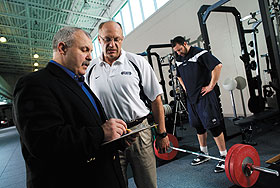UConn's contributions to health, environment, showcased
by Sherry Fisher - February 9, 2009
|
For the next several weeks, the Advance will continue presenting sections of a report produced by University Communications in conjunction with a study by Stanley McMillen, chief economist at the Connecticut Department of Economic and Community Development. The UConnomy report outlines the many ways the University contributes to the state’s economic well being.
The complete UConnomy report and Fast Facts highlights are online.
Part of the report discusses how preserving the environment and promoting the health of Connecticut's citizens are equally crucial in sustaining the state’s economy. It says outstanding health care services and advanced research are generating a healthier, more productive workforce. It also says that UConn integrates eco-friendly policies into its daily operations, and tackles conservation challenges confronting the region.
Examples include:
- UConn has implemented a range of policies integrating “green” thinking into campus building construction, buying local produce, and raising bees for honey production. Faculty members are investigating solar energy, biodiesel production, and fuel cells, while student groups promote environmental awareness.
- The Ergonomics Center at the Health Center provides workplace ergonomics evaluation and training for private firms, as well as for state employees, keeping Connecticut workers healthy and productive.
- Within the College of Agriculture and Natural Resources, scientists study animal diseases that have an impact on public health in Connecticut. At the Center of Excellence for Vaccine Research, vaccines and diagnostic tools developed to identify and treat diseases affecting poultry, cattle, and swine improve the agricultural economy and enhance the retail food industry.
- Discoveries by UConn faculty are valuable in keeping the natural world clean. Board of Trustees Distinguished Professor of Chemistry Steven Suib and his research group in the College of Liberal Arts and Sciences developed a membrane that can absorb up to 20 times its weight in oil and can be recycled many times. This could have a major environmental impact with its potential for cleaning oil spills and filtering water.
- The School of Nursing is dedicated to educating tomorrow’s nursing scholars and clinicians, while supporting patients across the state with public health services. Each week, more than 300 nursing students provide some 5,000 hours of care to patients and residents at area health care agencies, and this has an economic impact of more than $3.5 million annually.
- Striving to improve the well being of at-risk populations, experts at UConn’s Center for Health, Intervention, and Prevention (CHIP) conduct international research in areas including cancer prevention, diabetes management, and substance abuse. The Center’s director, psychology professor Jeffrey Fisher, alone has received more than $22 million in federal grants since 1989 to help reduce the incidence of HIV and AIDS.
-
 |
| William Kraemer, professor of kinesiology, left, and Gerard Martin, strength and conditioning coach, meet in the strength and conditioning facility at The Burton Family Football Complex and Mark R. Shenkman Training Center. Photo by Paul Horton |
The Neag School of Education develops future leaders in fields such as athletic training, exercise science, and physical therapy. The School is home to the nation’s #1 kinesiology doctoral program, as ranked by the American Academy of Kinesiology and Physical Therapy.
- Connecticut’s Latinos endure health problems at levels disproportionate to the rest of the population. Through the Connecticut Center for Eliminating Health Disparities among Latinos, UConn engages in outreach and research projects to reduce or prevent these disparities.
- Together with UConn’s schools of Dental Medicine, Medicine, and Nursing, the School of Pharmacy takes part in the Urban Service Track Program, preparing health care professionals who provide health care to the underserved in Connecticut’s inner cities.
- The University prepares the students who will serve as leaders in Connecticut’s health care organizations. For 30 years, the Center for Healthcare and Insurance Studies, in the School of Business, has been a resource for students interested in health care management careers, offering degree programs in the field.
- Correctional Managed Health Care, a partnership between the Health Center and the state Department of Correction, provides comprehensive health care to inmates in the state’s correctional facilities. This program includes clinical services and case management in medicine, surgery, dentistry, and mental health and specialty care for 19,000 state inmates.
- The Connecticut Poison Control Center at the Health Center provides free advice about poison exposure. Each year, staff members give immediate medical advice to more than 30,000 callers and prevent more than 20,000 needless emergency room visits, saving the state’s citizens nearly $4.1 million.
- Physicians in the Pat and Jim Calhoun Cardiology Center at the Health Center incorporate the latest scientific knowledge into their diagnoses and treatment of diseases of the heart and blood vessels, using sophisticated imaging techniques to identify problem areas and the latest medical and surgical strategies to repair them. Cardiologist Michael Azrin has perfected the technique of accessing the heart for angioplasty through a small artery in the wrist, which reduces risk of bleeding and speeds recovery. Director Bruce Liang has identified a protein that is a marker of heart failure, which could help improve clinical decision making.
|
|



